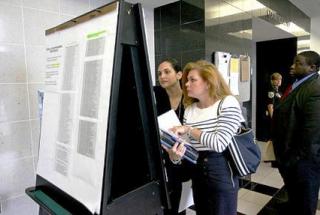|
Article Courtesy of The Palm Beach Post By Kimberly Miller Published April 2, 2012 The so-called foreclosure king of Florida knew his reign was over four months before his law firm's doors would officially shutter. "There's nothing left for you here. There's nothing left for me here. We're done. And that's the end of the story," one of David J. Stern's chief employees remembers him telling her in November 2010, according to her deposition.
And the 368,000-case backlog in the state's foreclosure courts has grown as the Stern firm's wayward files added to the logjam, some attorneys said. "Let's face it : Florida was struggling with foreclosures in the first place," said Sylvia Ayalon, a former analyst at the Consumer Mortgage Audit Center in Fort Lauderdale, who now works for Fembi Mortgage in Miami. "That combined with a defective process, the large footprint of the Stern firm, and the backlog just continues to grow." Still, there has been some progress in the foreclosure courts since the unprecedented rise and fall of The Law Offices of David J. Stern. Repairs to the Stern files, where necessary, leave stronger legal claims that could protect future home buyers from having to defend title to their home, said foreclosure defense attorney Frank Albear of LaBovick Law Group in Palm Beach Gardens. Also, Florida's courts have started paying more attention to allegations of fraud and the defenses of homeowners, said Roy Oppenheim of Oppenheim Law in Weston. "The entire chapter before the collapse was one of the darkest hours in the history of the Florida Bar and jurisprudence," Oppenheim said. "But now, arguments we've been making are resonating, we're getting cases dismissed, and judges are no longer taking at face value everything the banks say." Stern's company, founded in 1994, grew to one of the largest firms in Florida by 2009, handling tens of thousands of foreclosures for federal mortgage giants Fannie Mae and Freddie Mac and netting an annual revenue of $260 million, according to a January lawsuit filed by a company that bought Stern's back room business in early 2010. But by fall of that year, allegations surfaced nationwide about illegal shortcuts banks took to speed the foreclosure process, including robo-signing - a term used to describe several practices including forgery, notary fraud and swearing to the veracity of documents despite not having read them. Some law firms, including Stern's, were accused of similar practices. After then-Florida Attorney General Bill McCollum announced in August 2010 that he was investigating a few so-called "foreclosure mills," and depositions were released of former Stern employees, Fannie Mae and Freddie Mac fired Stern's firm. The company slashed 70 percent of its workforce. "Within two weeks, everything was pretty much gone," Stern said in an April deposition taken as part of a lawsuit filed by former employees who accused the company of violating Because Fannie Mae and Freddie Mac took their files from Stern's office, his attorney, Jeff Tew, has argued the company could do little to help with an orderly transfer to new lawyers. A letter sent to Florida's chief judges in March 2011 from Stern said he was closing his offices at the end of that month, leaving the 100,000 cases statewide dangling. "I'd say it was unprecedented, especially in the way it was done," said Palm Beach County Chief Judge Peter Blanc, whose court had about 9,000 Stern foreclosures. "He just said he wasn't going to represent his clients, which is contrary to the rules of law." Attorneys are required to officially withdraw from cases, but Stern said he no longer had the manpower to file such paperwork. While the Stern firm is no longer practicing law, Tew said it does have a few employees working with him on 25 lawsuits against former clients to collect fees of about $35 million. The downsized staff is also responding to requests for records coming from banks doing audits of foreclosure cases required by the Office of the Comptroller of the Currency. Judges and foreclosure defense attorneys said they are frustrated about former Stern cases still complicating the courts a year later. "In many cases, new firms came in and requested even more time to review the files, and had to amend complaints and otherwise correct errors they blamed on Stern," said Miami-Dade County Circuit Judge Jennifer Bailey, whose court had about 20,000 Stern cases. Royal Palm Beach-based defense attorney Tom Ice said new attorneys on Stern cases allege that original notes to mortgages are lost, when Ice suspects they are really being held by Stern in connection with his pursuit of unpaid fees. Tew confirmed the company "has not released original documents to some former clients who have not paid what they owe the law firm." Less of a concern is the Florida Bar's lack of sanctions in cases of alleged foreclosure fraud. Ice said such investigations take a long time, while Albear, of LaBovick Law Group, said it may be hard to prove the "boots on the ground" knew of wrongdoing. "We are working as diligently as we can," said Ken Marvin, director of lawyer regulation for the Florida Bar. "When this stuff hit the fan, the numbers were incredible. It was a storm that wasn't forecast by the Weather Channel." |
